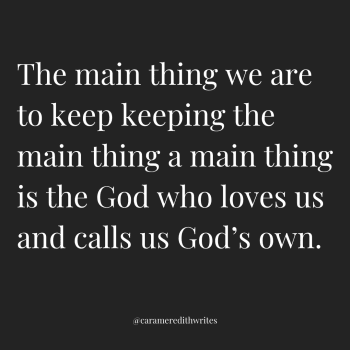Sometimes, when my boys are feeling particularly silly, they’ll change a word or two in a song to make it to their liking. Because they are six and nearly four years old, this generally results in a “No potty talk!” sort of rebuke from me.

But a couple of weeks ago, they started singing the following song:
Mother, we adore you,
And we lay our lives before you,
How we love you.
They were just trying to get me to laugh – and it worked. But the song did something deeper in me, testing the boundaries of my faith, making me wonder why a single word could make my eyes dart from side to side. Did anyone hear what they just sang? Is this even allowed?
If you grew up in evangelical culture, you’re probably humming the song along with me right now. But if your church was anything like mine, we didn’t sing to our mother in heaven, we sang to our father in heaven.
The trinity existed of equal parts Father, Son and Holy Spirit – three persons in one, somehow bound together, yet operating as individuals, courtesy of one magical, Christian fell swoop way back in the day.
To even think of God as mother was not only outside the realm of possibility, but in no way, shape or form would it be allowed to live within any realm of possibility.
So, imagine my surprise when I went to seminary and began learning that God is neither male nor female, and that although Christian doctrine states that God is genderless, the Church throughout the centuries have continued to speak of God as male (167).
And imagine my surprise when I discovered that I no longer had to limit myself to believing God existed solely in male form, that God – believe it or not – would continue to love his or her crazy ol’ daughter regardless of pronoun use?
Of course, I’m not alone in these thoughts, for theologians and thinkers and writers have been formulating assertions just like these for hundreds of years. Most recently, though, Jonathan Merritt’s thoughts in his new book, Learning to Speak God from Scratch, which releases today, make me realize that I’m not alone.
“Saint Augustine described God as a mother who feeds her earthly infants with heavenly food. The ancient church father Gregory of Narek spoke of God as both “Father Almighty” and “Mother of All.” The famous Franciscan writer Anthony of Padua also described God with feminine imagery in the twelfth century, as did Teresa of Avila in the sixteenth century. And the Syriac church has used feminine language to speak of the Holy Spirit for centuries. These images weren’t controversial because, unlike us, early Christians didn’t treat gender as a wedge issue in a culture war” (169).
Were I sending this from Twitter, I’d reply with a single word: BOOM. But seeing as we’re in a space conducive to more than 240 characters, I’ll be honest with you and say that I’m still learning how to color outside the lines when it comes to this conversation.
Sometimes, when I’m sitting in church and a song seems to be filled with a few too many masculine pronouns, I’ll dip my toes in the water of a soft-spoken “her” or “she” instead. Sometimes, when I’m reading the boys a book from Desmond Tutu’s Children of God Storybook Bible, I’ll purposefully change the pronouns from masculine to feminine, the word “Father” to “Mother.” And sometimes, when I’m speaking, I’ll oftentimes omit pronouns altogether when I talk about God, instead inserting all the different names I know and hold for God, therefore avoiding pronoun use altogether.
But I don’t think I’ve actually prayed to my Mother God yet.
I guess you could say, as the theme of this blog would suggest, that I’m still learning to color outside the lines. But as per the usual, I tend to think that’s a good thing.
—
We’ve got the potential for a couple of different conversations here, but I’ll end with this: go grab a copy of Learning to Speak God from Scratch. You won’t regret it. If you’ve felt stuck in and by seemingly age-old words of faith, like you don’t know how to use them anymore or have wondered where they fit into your world today, Jonathan’s book (which holds essays on a number of different sacred words) will refresh you. Enjoy!
*Post contains Amazon Affiliate links.













